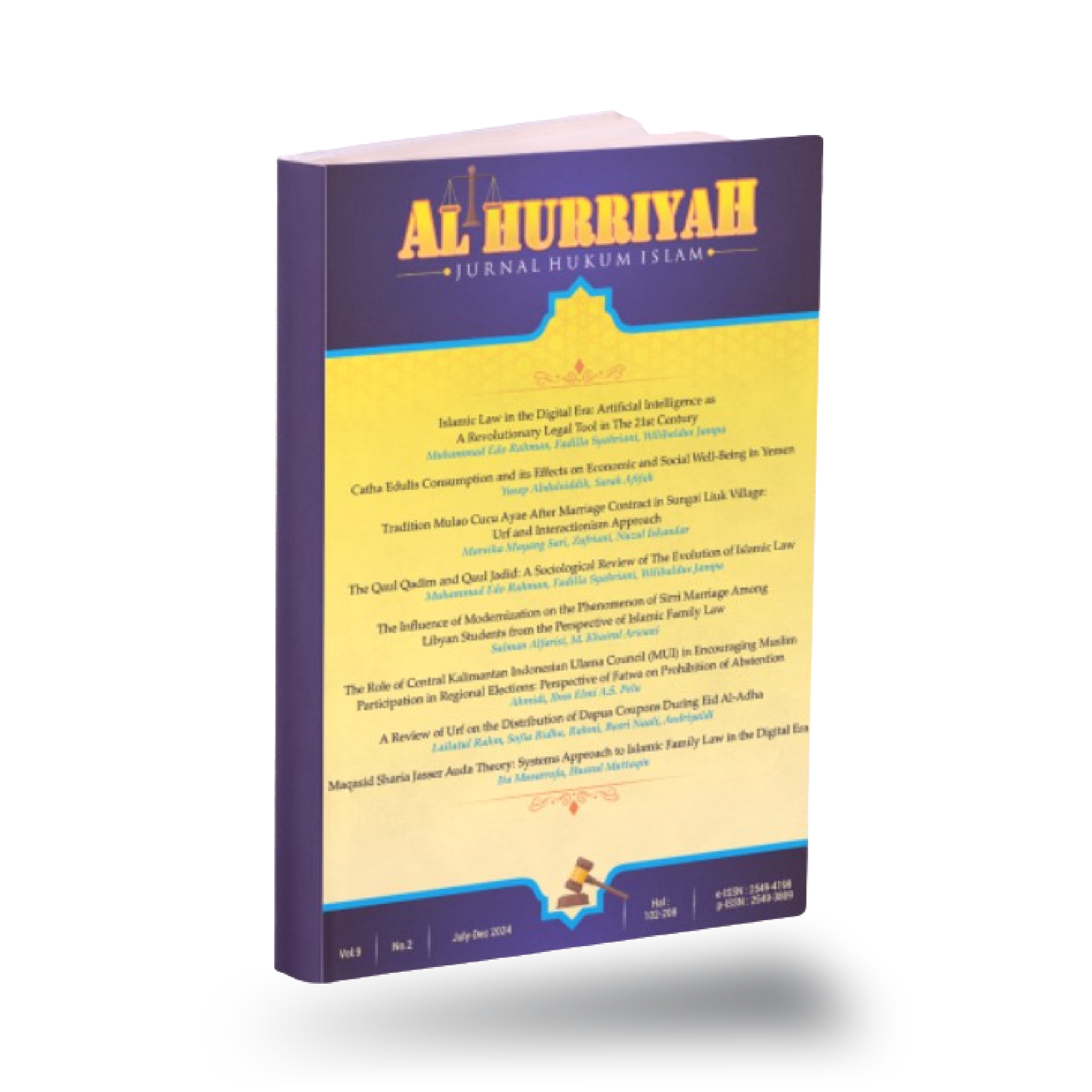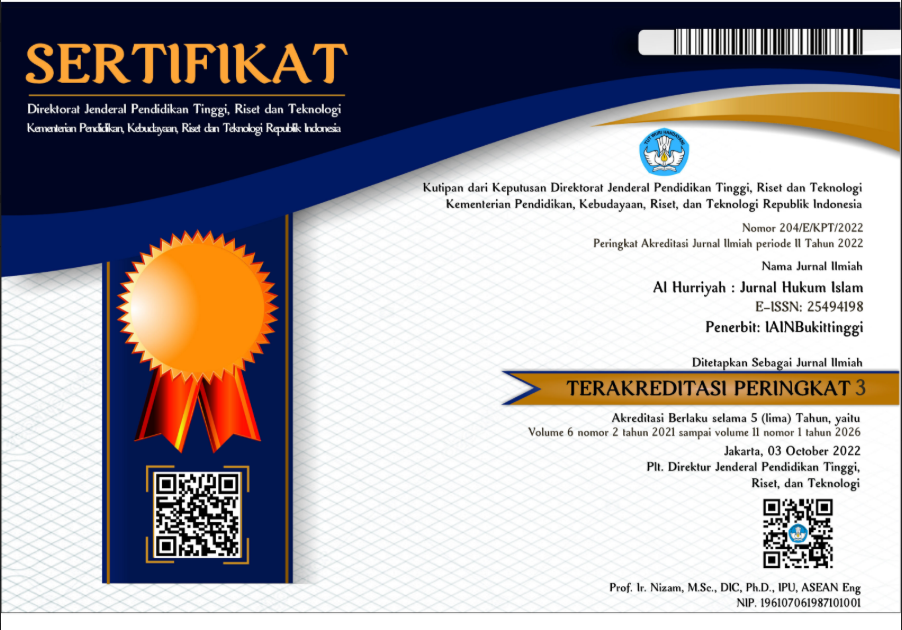Review of Islamic Law on the Practice of "Paylater" in Buying and Selling Transactions
DOI:
https://doi.org/10.30983/al%20hurriyah.v8i1.5262Keywords:
PayLater, E-commerce, Buying and selling.Abstract
PayLater is a financial facility in the form of a payment method with installments without a credit card. E-commerce transactions are legal as long as the goods sold are in accordance with the details, pictures, and illustrations displayed on the internet page. This research is included in the category of literature study, and if viewed from the side of the research paradigm, it is a type of descriptive-qualitative research. After an in-depth study, it was concluded that if the practise of PayLater in buying and selling transactions is allowed for clear contractual reasons and judging from the general argument that allows it and also the nash that prohibits it, it does not exist. The important thing is that the price increase on the suspension is still at a fair and reasonable price, and there is no element of coercion between the two parties. However, it needs to be balanced based on an understanding of the potential risks it poses, such as consumptive and the risk of debt, if not used wisely and carefully.
PayLater adalah sebuah fasilitas keuangan yang berupa metode pembayaran dengan cicilan tanpa adanya kartu kredit. Transaksi e-commerce sah hukumnya selama barang yang dijual belikan sesuai dengan rincian, gambar dan ilustrasi yang dipajang di laman internet. Penelitian ini termasuk kategori studi literature yang ditinjau dari sisi paradigma penelitian maka termasuk jenis penelitian deskriptif-kualitatif. Setelah dilakukan kajian mendalam diperoleh sebuah kesimpulan bahwa praktik PayLater dalam transaksi jual beli diperbolehkan dengan alasan akad yang jelas dan karena dilihat dari dalil umum yang membolehkan dan juga nash yang mengharamkannya tidak ada, yang penting penambahan harga pada penangguhannya masih dengan harga yang pantas dan sewajarnya, dan tidak ada unsur pemaksaan antara kedua belah pihak. Namun perlu diimbangi berdasarkan pemahaman atas potensi risiko yang ditimbulkannya, seperti konsumtif dan resiko berhutang jika tidak dipergunakan secara bijaksana dan seksamaReferences
Anshori, Abdul Ghofur. (Konsep, Regulasi, Dan Implementasi) (Yogyakarta: Gadjah Mada University Press, 2010).
as-Sa’di, Syekh Abdurrahman dkk, Fiqh Jual Beli: Panduan Praktis Bisnis Syariah (Jakarta: Senayan, 2008).
Aulianisa, Sarah Safira. "Konsep Dan Perbandingan Buy Now, Pay Later Dengan Kredit Perbankan Di Indonesia: Sebuah Keniscayaan Di Era Digital Dan Teknologi." Jurnal Rechts Vinding: Media Pembinaan Hukum Nasional (2020), Vol. 9, no. 2, 2020.: 183-194.
B, Farras. “Gojek Hingga Traveloka, Ini Platform yang Sediakan PayLater. CNBC Indonesia. https://www.cnbcindonesia.com/tech/20190510 180848-37-71799/gojek-hingga-traveloka-iniplatform-yang-sediakan-pay-later (Diakses 10 Oktober, 2021).
Badri, Muhammad Arifin bin. Panduan Praktis Fikih Perniagaan Islam (Jakarta: Darul Haq, 2015).
D, Aristanti, N. “PayLater, Kartu Kredit Zaman Now yang Ternyata Bisa Bikin Kalap†Belanja! Koin Works. https://koinworks.com/blog/apa-itu-pay-later/ (Diakses 10 Oktober, 2021).
Dannirrahman, Muhammad. “Tinjauan Hukum Islam Terhadap Praktik Jual Beli Kredit Online Pada Aplikasi Cicil.co.idâ€, skripsi (Semarang : Universitas Islam Negeri Semarang, 2019).
Harum, Ubay. Murabahah dalam Perspektif Fiqh dan Sistem Perbankan Islam, Jurnal Hukum Islam, Vol. V, 2006.
Hasan, M. Ali. Berbagai Macam Transaksi dalam Islam (Fiqh Muamalah) (Jakarta: PT Raja Grafindo Persada, 2003).
Mardani, Fiqh Ekonomi Syariah (Jakarta: Prenadamedia Grup, 2012), hlm. 108-109.
Mubarok, Jaih. Hasanudin, Fiqih Mu‟amalah Maliyah Akad Jual-Beli (Bandung: Simbiosa Rekatama Media, 2017).
Nawawi, Ismail. Fikih Muamalah Klasik dan Kontemporer Hukum Perjanjian, Ekonomi, Bisnis, dan Sosial (Bogor: Ghalia Indonesia, 2012).
P, Aria. “Pahami Risiko PayLater, Fitur Penggoda Milenial Berbelanjaâ€â€” Katadata.co.id. Kata Data. https://katadata.co.id/berita/2019/09/28/pahamirisiko-pay-later-fitur-penggoda-milenialberbelanja (Diakses 10 Oktober, 2021).
Pasal 4 huruf b Undang-Undang Nomor 19 Tahun 2016 tentang perubahan atas Undang-Undang Nomor 11 Tahun 2008 tentang Informasi dan Transaksi Elektronik.
Prastiwi, I. E., & Fitria, T. N. Konsep Paylater Online Shopping dalam Pandangan Ekonomi Islam. Jurnal Ilmiah Ekonomi Islam (2021), 7(01), 425-432.
Rahayu, Ning. Ini Dampak Perkembangan E-Commerce Bagi Indonesia, https://www. wartaekonomi.co.id/read216033/ini-dampak-perkembangan-e-commerce-bagi-indonesia.html (Diakses 10 Oktober, 2021).
Rasjid, Sulaiman. Fiqh Islam (Hukum Fiqh Lengkap) (Bandung: Sinar Baru Algensindo, 1994), Cet. Ke-27.
Ridwan. Hukum Ekonomi Syariah di Indonesia, (Purwokerto: STAIN Press, 2016).
S, Burhanuddin. Hukum Kontrak Syariah (Yogyakarta: BPFE-Yogyakarta, 2009).
Sjahputra, Imam. Perlindungan Konsumen Dalam Transaksi Elektronik. Alumni, Bandung, 2010.
Sudiarti, Sri. Fiqh Muamalah Kontemporer (Sumatera Utara: Febi UIN-SU Press, 2018)..
Wafa, Khairul. "Tinjauan Hukum Ekonomi Syariah terhadap Shopeepay Later." Jurnal Hukum Ekonomi Syariah (2020), Vol. 4, No. 1: 16-30.
Downloads
Published
How to Cite
Issue
Section
Citation Check
License
Copyright (c) 2023 Shevira Arista Achmanda

This work is licensed under a Creative Commons Attribution-ShareAlike 4.0 International License.
Authors who publish with this journal agree to the following terms:
- Authors retain copyright and grant the journal right of first publication with the work simultaneously licensed under a Creative Commons Attribution-ShareAlike 4.0 International License that allows others to share the work with an acknowledgment of the work's authorship and initial publication in this journal.
- Authors are able to enter into separate, additional contractual arrangements for the non-exclusive distribution of the journal's published version of the work (e.g., post it to an institutional repository or publish it in a book), with an acknowledgment of its initial publication in this journal.
- Authors are permitted and encouraged to post their work online (e.g., in institutional repositories or on their website) prior to and during the submission process, as it can lead to productive exchanges, as well as earlier and greater citation of published work (See The Effect of Open Access).





